PDF chapter test TRY NOW
The poem "Chivy" revolves around the phrases that grown-ups tell children on a daily basis. The poem takes the format of having phrases arranged one below the other and looks like orders. The phrases are not said in a polite manner, rather they are meant for the child to obey immediately. The first phrase that the poet mentions is "Speak up". This is mostly used by adults when a child is shy or introverted. Children can have a fear of talking in front of people due to various reasons. For some, it is fear of being laughed at. For some, it is a fear of getting things wrong.

Shy child, motivated to talk
Rather than understanding the child's situation and motivating to get rid of the fear, most adults pressure them to speak up. They don't realise that it is perfectly normal to have fears. One can work on any fear with the right kind of help, but blindly asking them to do the thing that they fear without addressing the real issue may only aggravate the situation.
The same adults who pester a child to speak up when he is not ready should also ask him to not speak when his mouth is full. It is true that when one speaks while eating, digestion problems can be created. But the problem is that children are only given orders and they have no idea of the logic behind them. The children are not made to understand that it is a healthy thing to not speak while eating as it might also cause the child spitting food across. The child just internalises the two orders that he has to speak and not speak. As a result, the child gets visibly confused.
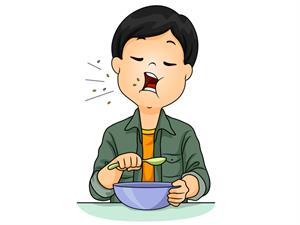
Child speaking with mouth full of food
Problems might not be created if the proper reason behind each phrase and when to apply them is conveyed to the child. Every child deserves to know the purpose of his own actions. Children tend to get excited about little things, as they easily notice them. 

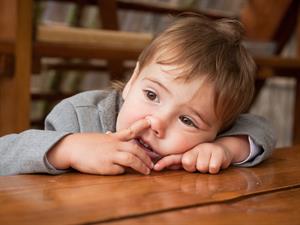
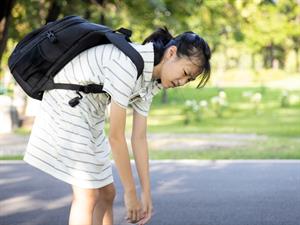
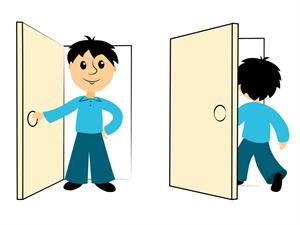
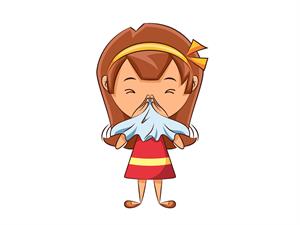
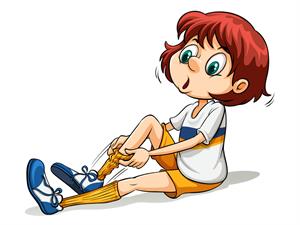
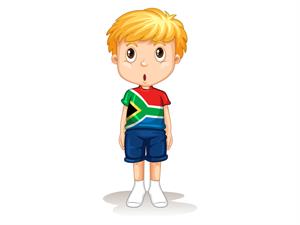
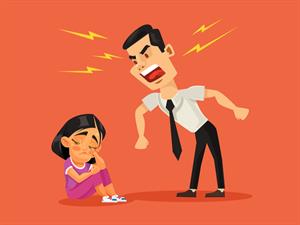

They find new things that interest them. A small firework on the sky, a free sticker for a cookie, or a cake shaped like a mermaid, anything can grab their attention. Unlike adults who keep running about in pursuit of materialistic things, children tend to adore the beauty around them. They may stare at the things that interest them. Childhood is also when the mind is curious and has a lot of doubts. The child can also stare at something he does not understand. Adults tend to stop the child from staring rather than quenching their curiosity or encouraging them to adore the beauty in the little things around them. This dims the ability to question in a child.

Child staring at fireworks
When children see things that interest them or when they want to talk about something, they point their fingers at them. This is to specify their need to the adults. Sometimes when they talk about someone, pointing their fingers at them can cause trouble as it grabs the attention of people who they are talking about. They might misunderstand that the child is talking ill about them or might know that they are being pointed at. But children do not care about it as they are not conscious about other people watching or talking about them, like adults. They are asked not to point at anyone but are not taught how they are supposed to convey their needs and emotions. Rather than telling them what not to do, adults could teach children to replace bad behaviours with good ones.

Child pointing fingers
Children often tend to pick their nose as they are not aware of hygiene at a very young age. Picking one's nose can cause the spread of germs and may lead to infectious diseases. But children pick their noses subconsciously most often and it becomes a habit. They also do it when they are bored or their mind is occupied with something. Adults could teach them hygienic habits and encourage them to raise the issue to the adults if they feel a nasal block.

Child picking nose
Children may experience tiredness or maybe lazy at times. They may slouch and be lethargic. It can be during a class or a prayer meet. When parents have conversations that only people of their age understand, or if the children find a particular thing boring, then they tend to lie down or slouch. But they are asked to sit up straight and pay attention even if they do not get the purpose. When one needs something, it is always polite to use words like please, would you etc. It is basic manners to be polite when one needs a favour. But children are encouraged to say please even if it is not required. They are also not taught the purpose of the word. They are blindly made to say a few words which do not make sense to them. One must teach them that words like thank you, please, are meant to treat the other person as equal. It is not fair to order everyone around. But the adults who teach this, do not use the word please to the children to make them do things. Rather they themselves order them about with a to-do list.

Child slouching
As years pass, humans are becoming more intolerant. For example, children make noise and it is normal to some extent. Adults get impatient for these small events and order children to remain quiet. They can find a solution to distract them with other things to make them quiet, rather than bluntly asking them to remain silent.
Children are playful and absent-minded most of the time. They run around playing with each other, enjoying themselves. They are not very privacy oriented and do not understand the need for people to have a secluded closed space. Children most often do not get embarrassed easily. But as they grow into adults, they become more reserved and conscious of their surroundings. It is not a bad thing to crave for privacy, but adults should understand that children do not understand the concept. So when they walk into a room and leave, they do not close the door behind them. People inside the room may have been in a meeting or working. This might disturb them. But they do not explain to the child hat they are disturbed by the external noise, but order the children to shut the door behind them.

Closing the door behind
Children can be lazy and they drag their feet behind them when they walk. They walk really slow that it appears as if they are dragging their feet behind. This usually happens when they are doing something that they do not like to do generally, for example, going to do a small chore that was given by a parent or going to school. Parents or teachers can advise or emphasise on the importance of the chore or make it more interesting for them to speed up.
Young children and adults are expected to carry a handkerchief with them always. This is another practice to ensure hygiene. People generally use handkerchiefs to wipe their sweat. It can also be used to wipe anything that spills on them. Compared to adults, children tend to spill their food or other things easily. The question here is if the children are taught how to wipe their sweat or their hands. Without having any knowledge of that, adults question only the possession of a handkerchief. They are also asked to remove their hands from their pockets, which is another order which does not have any purpose. It is probably for checking that their hands are empty.

Child using handkerchief
Children are immature and cannot take heavy decisions by themselves. They need the constant guidance and support of adults. They take help from parents to wear uniforms, take food, etc. In that case, parents look for perfection. After a game or so, a child's socks may get pulled down due to all the activities. Children must be allowed to have fun without getting worried about perfection sometimes. Although discipline is important, sometimes it need not be stressed over.

Pulling socks up
Children have to live their own life without having people to tell them what to do always. Just like the phrase "sit up" in stanza 1, people also want children to stand up whenever they need them to. Rather than asking them to merely stand up, they could provide them with the reason for wanting them to. Most adults feel like they do not owe an explanation to children for the orders they make. They also want them to stand up straight, furnishing more details into how they want their orders to be followed. Children are also expected to say thank you to everyone. In the same way, as they are not taught the purpose of polite words like please, children are not taught why it is important to thank them.

Child standing straight
One of the major flaw of an adult is when they assume that they know all things and that they are ultimate. So when children want to express their thoughts, they are silenced. They are asked not to interrupt them. Adults must understand that even little children can contribute their ideas and it can be effective. Even if adults are having a serious conversation, it can just be informed that they will hear the child out at a different time.
Children need encouragement and constant motivation from adults. They may try out a new thing and it may fail. But when adults find fault with them and try to criticise them, it stunts their growth. Children start believing that they are good for nothing. Children most often seek validation for their efforts. They want to be thought of as funny, smart, bright etc. Adults may sometimes lose their temper and shout at them that they are not funny or smart. They may forget having said those words after a while. But those words remain etched in children's minds forever and it impacts the self-confidence as they grow up.

Harsh criticism can affect self-confidence
The poet also talks about pointless things that adults tell children. For example, keeping their elbows on the table while eating is considered to be a bad habit. It can also be told as it may disturb people who are eating. But there is no logical reason behind these etiquettes. It has been passed down by generations and children are expected to follow them without a proper reasoning.

Keeping elbows on table
The poet concludes the poem with a couplet. A couplet is a stanza comprising of two lines. Having given orders and instructions as to how to move, sit, stand, eat, all through their lives, adults question children if they cannot make up their own minds. The poet wonders how a child is supposed to live or make his own decisions when their entire lives are filled with people telling them what to do and what not to. When children are made to act like machines, they tend to become like machines who are indecisive.
